小升初四大时态综合复习与检测_小班
小升初四大时态综合复习与检测-小班.doc

小升初四大时态综合检测%1.选择题。
)1. Look! Li Ping and Li Ying basketball now.A. playB. playedC. are playingD. will play)2. What did you do last night? I did my homework and TV.A. watchB. watchedC. am watching)3. Can I this book?A. haveB. hasC. had)4.1 English at 7:00 this morning.A.readsB. readC. reading)5. He to school tomorrow.A. wentB. goC. will go)6. Did your father his friend on the 5th of October?A. calledB. callC. is calling)7. Where you last night?A. wasB. areC. were)8. —Can you me with my Englsih? —Sure.A. helpsB. helpingC.help)9.She like summer.A. doesn'tB. don'tC. didn't)10. There a table in Jenny's room.A. amB. isC. areD. were)11.-・-May I to Marry? …This is Mary speaking.A.speakingB.speakC.speak toD.say to)12.They like to music.A.listeningB.listensC.listenD.listened.)13.John in an office.Her parnents in a hosptaLA. work,worksB.works ,workC.work,workingD.is working,work )14. Where he from?A.is,comeB.do,comeC.does,comeD.is,from)15.—What is Tom doing in the classroom?—He something on the blackboard.A.drawsB.drawC.is drawingD.are drawing)16. — Are you going to be an engineer in the future?.A.YesJ want to be a dancerB. Yes,Fm notC. Yes,I am)17. —Will his parents go to see the Terra Coatta Warriors tomorrow?A.they w川n'tB.they won'tC.they aren'tD.they don't)18.Mother me a nice present on my next birthday.A.will givesB.will giveC.givesD.give)19. Laura to school yesterday.A. doesn't goB. didn't goesC. doesn't wentD. didn't go)20.1 a beautiful girl on the street yesterday afternoon.A. seeB. seesC. sawD. seed%1.用动词的适当形式填空。
小升初专题复习--四种基本时态
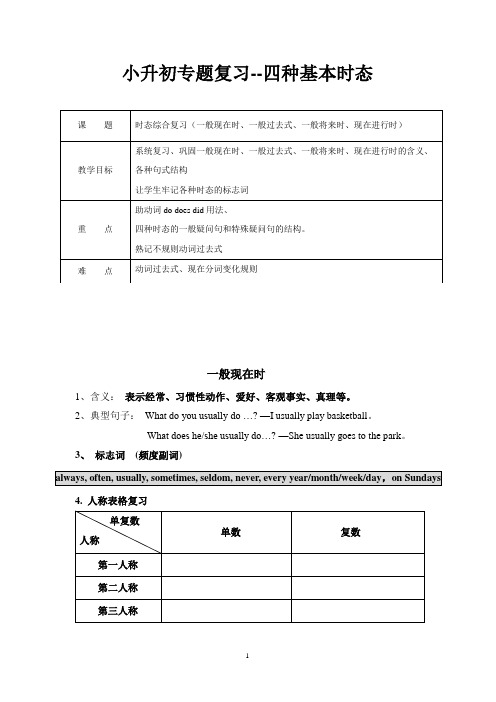
小升初专题复习--四种基本时态一般现在时1、含义:表示经常、习惯性动作、爱好、客观事实、真理等。
2、典型句子:What do yo u usually do …? —I usually play basketball。
What does he/she usually do…? —She usually goes to the park。
3、标志词(频度副词)4. 人称表格复习※一般现在时中,第三人称单数作主语时,谓语动词的变化规则:1.一般情况下,直接加s,例如:get→gets.2.以o、sh、ch结尾的动词,加es . 例如:do→does.3.辅音字母加y结尾,改y为i,加es. 例加:study→studies.一般过去时1、含义:表示过去发生的动作与状态2、典型句子:I went to the zoo yesterday. Mary didn’t go to sc hool yesterday.What did he/she do…? What did you do…? Did you see Lucy last night?3、表示过去的时间状语(标志词)just now, a moment ago, yesterday, last week, last night, last weekend, last year, last month,two weeks ago, five years ago, this morning.※一般过去时中,动词过去式的构成规则1.一般情况下,直接加ed. 例如: visit→visited.2.以不发音字母结尾,加d. 例如:live→lived.3.以辅音字母+y结尾,把y改为i, 加ed. 例如:study→studied.4.重读闭音节结尾的词,双写末尾字母加ed 例如:stop→stopped.5.不规则变化例如:go→went. cut→cut.teach→taught一般将来时1、含义:表示将要发生的动作与状态2、典型句子:What are you going to do…?I am going to play football tomorrow.What is he/she going to do…?I will go to shanghai tomorrow3、一般将来时标志词tomorrow、soon、next week/ month/ year/ summer/holiday、in+时间段.4、结构表现在进行时1、含义:表示正在发生的动作或现阶段正在发生的动作(强调动作的持续性)2、典型句子:What is he/she doing now?What are you doing these days?Listen! Someone is playing the piano.Look! Lucy (sleep).3、标志词(牢记)4、结构表※现在进行时中,现在分词的构成规则:1.一般情况下,直接加ing.例:go→ going. carry- play fly go2.以不发音字母e结尾,去e加ing.例:live→ living. have→ having take →come →3.以1个元音字母+1个辅音字母结尾的单词,双写末尾字母加ing,例:stop→stopping. swim→swimming. st op → stopping. run→ running.sit→ put→ cut→ get→强化练习一.选择题。
小升初英语四大时态复习讲解及真题专项练习含答案
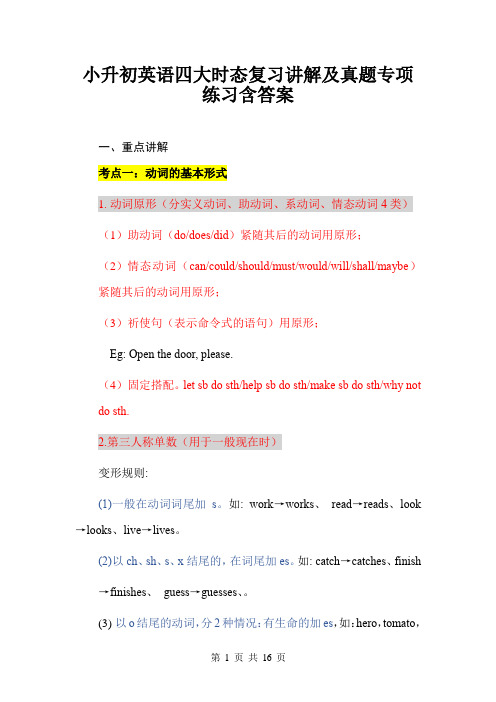
小升初英语四大时态复习讲解及真题专项练习含答案一、重点讲解考点一:动词的基本形式1.动词原形(分实义动词、助动词、系动词、情态动词4类)(1)助动词(do/does/did)紧随其后的动词用原形;(2)情态动词(can/could/should/must/would/will/shall/maybe)紧随其后的动词用原形;(3)祈使句(表示命令式的语句)用原形;Eg: Open the door, please.(4)固定搭配。
let sb do sth/help sb do sth/make sb do sth/why not do sth.2.第三人称单数(用于一般现在时)变形规则:(1)一般在动词词尾加s。
如: work→works、read→reads、look →looks、live→lives。
(2)以ch、sh、s、x结尾的,在词尾加es。
如: catch→catches、finish→finishes、guess→guesses、。
(3)以o结尾的动词,分2种情况:有生命的加es,如:hero,tomato,potato;没有生命的加s,如:radio,photo。
(4)以辅音字母加y结尾的动词,变y为ies。
如: fly→flies、study →studies、carry→carries.(5) 不规则变化。
如: have→has ,are→is,were→was3.现在分词(用于现在进行时)变形规则:(1)一般在动词后加ing。
如: work→working、read→reading、look →looking、wait→waiting。
(2)以不发音的e结尾的动词,去掉e,再加ing。
如: smile→smiling、move→moving、take→taking、write→writing。
(3)以重读闭音节结尾的且词尾只有一个辅音字母的,双写这个辅音字母加ing。
如: sit→sitting、stop→stopping、cut→cutting、run →running、swim→swimming.(4)少数几个以ie结尾的动词,将ie改为y加ing。
小升初英语题型四大基本时态总结

小升初英语题型四大基本时态总结2017小升初英语题型四大基本时态总结小升初英语考试不像中考英语一样题型是固定的,每个招生学校考查的题型会有所不同,但大致分起来,主要包括以下几类:(一) 考查语法类:1. 单项选择2. 用所给词的适当形式填空(二) 考查完形类:1. 选择性完形2. 首字母填空,将短文补充完整.(三) 考查阅读类1. 选择性阅读2. 任务型阅读(阅读短文,回答问题)(四)考查单词类1. 根据句子意思和汉语,填写合适的单词.2. 根据句子意思和所给首字母,填写合适的单词.3. 选出和其他不同的单词(五)考查句型类:1. 按要求转换句型.2. 连词成句.(六) 考查交际用语和情景对话类:1. 根据上下文内容,补全对话.2. 将两组问题和答语,进行正确搭配.(七)考查翻译类1. 根据中文提示,将句子补充完整.2. 根据所给中文,写出正确的英文句子.(八) 写作类给出话题和提示词或表格等,写出不少于 60 字的短文.(九) 其他类1. 单词辨音2. 智力测试小学英语四中基本时态总结1.一般现在时。
主要描述经常会发生的动作、状态或不变的'真理。
句末常出现everyday/week/year/Monday , in the morning, 句中常有always, usually, often, sometimes组成:主语+be+名词(形容词)I am a student.He istall.否定句:在be 后加notI am not a student.He is not tall.疑问句:be 动词提前到第一位。
—Are you a student?—Yes, I am. / No, I am not.—Is he tall?—Yes, he is. / No, he isn’t.主语+动词+地点+时间We go to school on Monday.He goes to the park on Sunday.否定句:主语+don’t/doesn’t’t+动词原形+地点+时间We don’t go to school on Monday.He doesn’t’t go to the park on Sunday.疑问句:在句首加do或does—Do you go to school on Monday?—Yes, we do./ No, we don’t.—Does he go to the park on Sunday?—Yes, he does./ No, he doesn’t’t.动词三单变化:1. 在原单词末尾加s , 如:like – likes2. 单词以o, sh, ch, s, x 结尾加es, 如:go – goes3. 单词末尾为辅音+y结尾去y加ies 如:study- studies2. 现在进行时:主要叙述正在发生的事情。
小升初四大时态综合复习与检测 小班
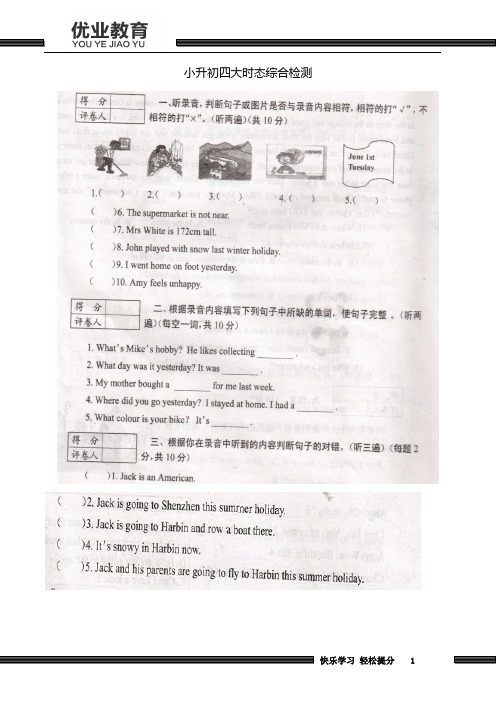
小升初四大时态综合检测一.选择题。
( )1. Look! Li Ping and Li Ying ________ basketball now.A. playB. playedC. are playingD. will play( )2. What did you do last night? I did my homework and _______TV.A. watchB. watchedC. am watching( )3. Can I______ this book?A. haveB. hasC. had( )4. I _______ English at 7:00 this morning.A.readsB. readC. reading( )5. He to school tomorrow.A. wentB. goC. will go( )6. Did your father his friend on the 5th of October?A. calledB. callC. is calling( )7. Where you last night?A. wasB. areC. were( )8. --Can you________ me with my Englsih? --Sure.A. helpsB. helpingC.help( )9.She like summer.A. doesn'tB. don'tC. didn’t( )10. There _______ a table in Jenny’s room.A. amB. isC. areD. were( )11.---May I ________ to Marry? ---This is Mary speaking.A.speakingB.speakC.speak toD.say to( )12.They like ______to music.A.listeningB.listensC.listenD.listened.( ) 13.John __ ____in an office.Her parnents _________in a hosptal.A. work,worksB.works ,workC.work,workingD.is working,work ( )14.Where _______ he ______ from?A.is,comeB.do,comeC.does,comeD.is,from( )15.--What is Tom doing in the classroom?--He _____something on the blackboard.A.drawsB.drawC.is drawingD.are drawing( ) 16. -- Are you going to be an engineer in the future?.-- _______A.Yes,I want to be a dancerB. Yes,I’m notC. Yes,I am ( )17. --Will his parents go to see the Terra Coatta Warriors tomorrow?--No,_________A.they willn’tB.they won’tC.they aren’tD.they don’t( ) 18.Mother_______me a nice present on my next birthday.A.will givesB.will giveC.givesD.give( )1 9. Laura ____ to school yesterday.A. doesn’t goB. didn’t goesC. doesn’t wentD. didn’t go ( )20. I ___ a beautiful girl on the street yesterday afternoon.A. seeB. seesC. sawD. seed二.用动词的适当形式填空。
小升初英语四大时态复习讲解及真题专项练习含答案

小升初英语四大时态复习讲解及真题专项练习含答案一、重点讲解考点一:动词的基本形式1.动词原形(分实义动词、助动词、系动词、情态动词4类)(1)助动词(do/does/did)紧随其后的动词用原形;(2)情态动词(can/could/should/must/would/will/shall/maybe)紧随其后的动词用原形;(3)祈使句(表示命令式的语句)用原形;Eg: Open the door, please.(4)固定搭配。
let sb do sth/help sb do sth/make sb do sth/why not do sth.2.第三人称单数(用于一般现在时)变形规则:(1)一般在动词词尾加s。
如: work→works、read→reads、look →looks、live→lives。
(2)以ch、sh、s、x结尾的,在词尾加es。
如: catch→catches、finish→finishes、guess→guesses、。
(3)以o结尾的动词,分2种情况:有生命的加es,如:hero,tomato,potato;没有生命的加s,如:radio,photo。
(4)以辅音字母加y结尾的动词,变y为ies。
如: fly→flies、study →studies、carry→carries.(5) 不规则变化。
如: have→has ,are→is,were→was3.现在分词(用于现在进行时)变形规则:(1)一般在动词后加ing。
如: work→working、read→reading、look →looking、wait→waiting。
(2)以不发音的e结尾的动词,去掉e,再加ing。
如: smile→smiling、move→moving、take→taking、write→writing。
(3)以重读闭音节结尾的且词尾只有一个辅音字母的,双写这个辅音字母加ing。
如: sit→sitting、stop→stopping、cut→cutting、run →running、swim→swimming.(4)少数几个以ie结尾的动词,将ie改为y加ing。
(完整版)小升初英语总复习----四种时态专项训练(精编)
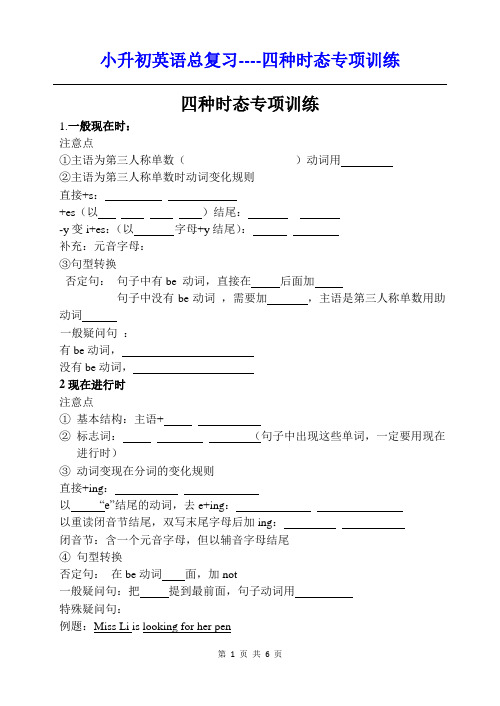
四种时态专项训练1.一般现在时:注意点①主语为第三人称单数()动词用②主语为第三人称单数时动词变化规则直接+s:+es(以)结尾:-y变i+es:(以字母+y结尾):补充:元音字母:③句型转换否定句:句子中有be 动词,直接在后面加句子中没有be动词,需要加,主语是第三人称单数用助动词一般疑问句:有be动词,没有be动词,2现在进行时注意点①基本结构:主语+②标志词:(句子中出现这些单词,一定要用现在进行时)③动词变现在分词的变化规则直接+ing:以“e”结尾的动词,去e+ing:以重读闭音节结尾,双写末尾字母后加ing:闭音节:含一个元音字母,但以辅音字母结尾④句型转换否定句:在be动词面,加not一般疑问句:把提到最前面,句子动词用特殊疑问句:例题:Miss Li is looking for her pen①②对①进行提问:对②进行提问:3一般过去时:注意点④句型转换否定句:主语+ (没有be动词)主语+ (有be动词)一般疑问句:以开头(没有be动词)以开头(有be动词)特殊疑问句:特殊疑问词+ + + ?(没有be动词)例题翻译:你家过去在哪里?4,一般将来时注意点①基本结构:主语+②标志词:next+年,月,日③句型转换:否定句:在be动词面加not他下周打算去公园吗?(一般疑问句)他下周打算去哪里?(特殊疑问句)④翻译:下周它将会是:_________ did you ________ the birds?2. Then, he let the boy go.(改为否定句)Then,he _______ ________ the boy go.3. They could play football.(改为一般疑问句,并作肯定回答)----________ they play football? ----Yes, they _________.4. Nancy lives in Nanjing now.(用last year 改写句子)Nancy _______ in Nanjing last year.5.I went to a shopping centre last Sunday.(改为一般疑问句,并作否定回答)---______ you ______ to a shopping centre last Sunday? ---No, I _________.6. He puts his things in order. (改为一般疑问句)___________________________________________________7. Did you go to bed late last night? (改为陈述句)____________________________________________________8. They often do their homework in the evening. (用she替换they)____________________________________________________9. You should put your books and toys on the floor. (改为否定句)_____________________________________________________10. He feels sleepy in the morning. (对划线部分提问)____________________________________________________11. This is Bobby’s bedroom. (对划线部分提问)____________________________________________________12. have, my, time, breakfast, I, always, on (.) (连词成句)____________________________________________________.13. The, out, the, get, lion, mouse, helped (.) (连词成句)____________________________________________________. 14. A monkey woke the tiger up.(改成一般疑问句)__________________________________________________15. Sam brings some water.(改成否定句)__________________________________________________16. Mike has some bread and milk for breakfast. (对划线部分提问)__________________________________________________17. The man sings well. (对划线部分提问)18. too, you, cola, much, drink, shouldn’t (.) (连词成句)______________________________________________________20 The children must play football on the road.(改为否定句)______________________________________________________ 21. We must look out for the traffic lights first.(对划线部分提问)______________________________________________________ 22. An old woman is crossing the road.(对划线部分提问)______________________________________________________ 23. You can’t watch TV now because it’s late. (对划线部分提问)______________________________________________________ 24. keep, desk, tidy, I, must, my, clean, and (.)(连词成句)______________________________________________________二用所给词的适当形式填空1.Let (we )(play) basketball this afternoon.2. (Be)your sister (visit) your parents tomorrow?3.Yang Ling is going to (make) clothes for her dolls.4. (child) Day is on the first of June.5. Tim usually (brush) his teeth in the morning.6.I (have) a birthday party last year.7.Tomorrow is Dragon Boat Festival. We (watch )a dragon boat race.8. They (eat) moon cakes last Mid-Autumn Festival?9.My parents ( watch) TV in the living room now.10. Your birthdayis coming. I (make) a cake for you.11.Let’s(play) the piano together.12.How many ( visit) are there in your group?13.My sister wants ( learn) about in England.14.My uncle is from ( Chinese).15.Animal ( love) will go to see them quickly.16.Jack (go )and look for his parents next week.17. (visit) from the US are very friendly.18.The girls ( learn) an English song next week.19.The students are very (excite).Because the game is very (e xcite).20.My mother likes ( listen)to music after dinner.21.He ( read) a book last night.22.Lucy is going to ( find) a book about e- cards.23.I (eat) some bread for breakfast yesterday.24.Can I ( have) an English book?25.We (are) twelve years old last year.26.I want (buy )a computer.27.What ( be) your parents going to do this weekend?28.We (fly) kites tomorrow.29.The boy ( come) to my house the day after tomorrow.30.What about (go )for a picnic next week?31. Mary’s birthday is next Monday, her mother (give) her a present.32.My mother ( buy) some snacks and drinks this morning.33. (Be) your family going to climb the hill next Sunday?34.Now, Bobby ( wear) his new clothes.35.This lesson (end) at half past eleven. Then you can have lunch.35. It is very cold these days . It (snow) tomorrow.36.-- You ( come here again next Saturday?---No. I (visit) my teacher.37.Hurry up! or we (be )late.38.--What you ( do) tomorrow afternoon?--I (see )a film with my friend.39.---Can you come and ( help )me with my English ,mum?。
小学英语四大时态总结计划附小升初时态考题[专享]
![小学英语四大时态总结计划附小升初时态考题[专享]](https://img.taocdn.com/s3/m/cb1320959b6648d7c0c746b1.png)
一般此刻时定义表示习惯性的动作或状态always oftenusually sometimes时间状语或标记性词 never everydayonce a weektwice a month句型构造:一定句主语+be〔am is are〕主语+行为动词〔原形/三单〕Be〔am is are〕+主语 Do/Does+主语+动原一般疑问句在句首加 Do 或 Does把 be动词提早动词还原主语+be〔am is are〕主语+donˊt/doesnˊt+动原否定句在主语后加 donˊt 或doesnˊt+not在 be后加 not动词还原一般过去时定义过去发生的动作或状态last holiday 上一个假期two days ago两天以前时间状语或标记性词 yesterdaythe day before yesterdayjust now句型构造:一定句主语+be〔was were〕主语+行为动词的过去式Be〔was were〕+主语 Did+主语+动原一般疑问句在句首加 Did把 be动词提早动词还原否定句主语+be〔was were〕+not在 be后加 not主语+didn′t+动原在主语后加didn′t动词还原此刻进行时定义正在发生的动作now时间状语或标记性词 at the momentat this time句型构造:一定句主语+be〔am is are〕+此刻分词Be〔am is are〕+主语+此刻分词一般疑问句把 be动词提早否定句主语+be〔am is are〕+not+此刻分词在be 后加 not一般未来时定义未来某个时辰发生的动作或状态next Sunday下一个周日时间状语或标记性词i n two hours两小时以后tomorrow 明日the day after tomorrow 后天句型构造:一定句主语+will +动原主语+be going to+动原一般疑问句W ill +主语+动原把 will 提早B e+主语+going to+动原把 be动词提早否定句主语+will +not+动原在 will 后加 not 缩写won′t主语+be+not+ going to+动原在 be后加 not注意: 1. 变一般疑问句时,一二人称要交换I-youwe-youmy-yourour-yourme-youmine-yours.2. some用于一定句, any 用于否定句和疑问句。
小学英语小升初复习时态四大时态的综合、导图及训练 动词时态练习及答案
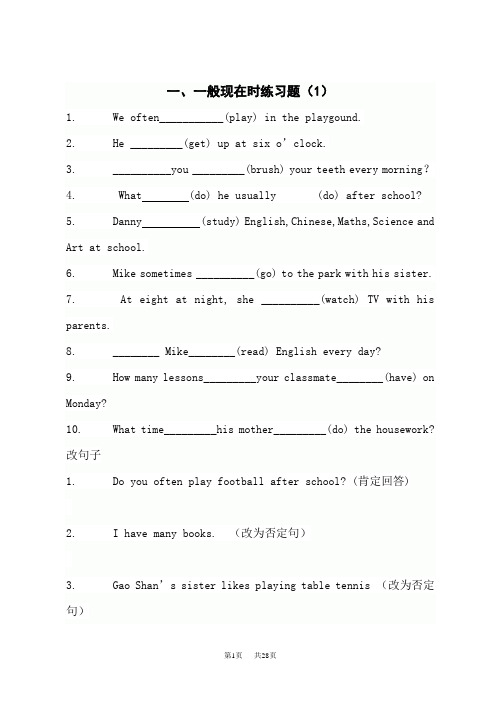
一、一般现在时练习题(1)1. We often___________(play) in the playgound.2. He _________(get) up at six o’clock.3. __________you _________(brush) your teeth every morning?4. What (do) he usually (do) after school?5. Danny (study) English,Chinese,Maths,Science and Art at school.6. Mike sometimes __________(go) to the park with his sister.7. At eight at night, she __________(watch) TV with his parents.8. ________ Mike________(read) English every day?9. How many lessons_________your classmate________(have) on Monday?10. What time_________his mother_________(do) the housework? 改句子1. Do you often play football after school? (肯定回答)2. I have many books. (改为否定句)3. Gao Sha n’s sister likes playing table tennis (改为否定句)4. She lives in a small town near New York. (改为一般疑问句)5. I watch TV every day. (改为一般疑问句)6. David has a goal. (改为一般疑问句)7. We have four lessons.(否定句)8. Nancy doesn’t run fast (肯定句)9. My dog runs fast.否定句:一般疑问句:10. Mike has two letters for him.一般疑问句:否定句:11. I usually play football on Friday afternoon.一般疑问句:否定句:一般现在时练习(2)1. He often (have) dinner at home.2. Daniel and Tommy (be) in Class One.3. We (not watch) TV on Monday.4. Nick (not go) to the zoo on Sunday.5. they (like) the World Cup?6. What they often (do) on Saturdays?7. your parents (read) newspapers every day?8. The girl (teach) us English on Sundays.9. She and I (take) a walk together every evening.10. There (be) some water in the bottle.二、现在进行时练习1、I _______________________( look for) a shirt, I’m looking fora tie.2、They ______________________( plant) flowers in the yard now.3、Miss Baker _________________( drink) milk in the cafeteria now.4、What are you _________(do) now? I ___________(eat) bread.5、It’s nine o’clock. My father_______________(work) in the office.6、Look, the boy____________(put) the rubbish into the bin.7、__________he__________(clean) the classroom? No, he isn’t. He____________(play).8、Where is Mak? He___________(run) on the grass.9、Listen, who____________(sing) in the music room? Oh, Mary_____________(sing) there.10、Who_______(sing)a song? ----Li Ying is.现在进行时练习(2)1、写出下例动词的现在分词形式1)give____ 2)use____ 3)clean____ 4)skate____ 5)draw____ 6)tell____ 7)do____ 8)write____ 9)get____ 10)put____ 11)take____ 12)stop____ 13)speak____ 14)swim____ 15)come____ 16)lie____ 17)die____ 18)cook____ 19)fly____ 20)help____ 21)close____ 22)see____ 23)run____2、用现在进行时连写句子1)Li Ping;learn;to;speak;English;____________________________________________________________it;rain;now____________________________________________________________3)they;watch;a football match;on TV____________________________________________________________he;look;out of the window;____________________________________________________________look;the dog;sleep;____________________________________________________________listen;the boy;talk;____________________________________________________________ they;have lunch;at seven o'clock____________________________________________________________ the students;write;homework;now;____________________________________________________________ 3、将下例句子改成一般疑问句1)Mike is climbing the hill。
2022小升初英语四大时态专项复习课件

考 点 2 动词过去式的变化规则。
专题十六 一般将来时
一般将来时表示将来某一时刻即将发生的动作或存在的状态, 也表示将来某段时间内经常发生的动作或状态。考 点 一 般将来时的三种句志词:next,tomorrow,soon,in+将 来时间,in+时间段,next month,next week,next year, next Friday,the day after tomorrow,tomorrow morning, in 2021,in two days(两天后)等。
一般过去时的时间标志词:last,ago,yesterday,just now, in+过去时间,last weekend,last night,last Monday,last winter holiday,many years ago,ten days ago,three months ago,five minutes ago,yesterday,the day before yesterday,in 2019,in 1998等。
2.一般将来时的用法。
3.通常情况下will和be going to 可以互换, 但是也有区别。
2022年小升初英语复习 全国通用版
四大时态专项复习
专题十三 一般现在时
一般现在时常用来表示经常性、习惯性、永久性的动作或客 观事实和真理等。 考 点 一般现在时的句型结构 1.be 动词的一般现在时。
be 动词的句型结构。
2.其他动词一般现在时的两种形式。
3.时间标志:every day, every week,every year,every morning,in the morning,in the afternoon,in the evening, sometimes,always,usually,often等。
小升初英语四大时态复习
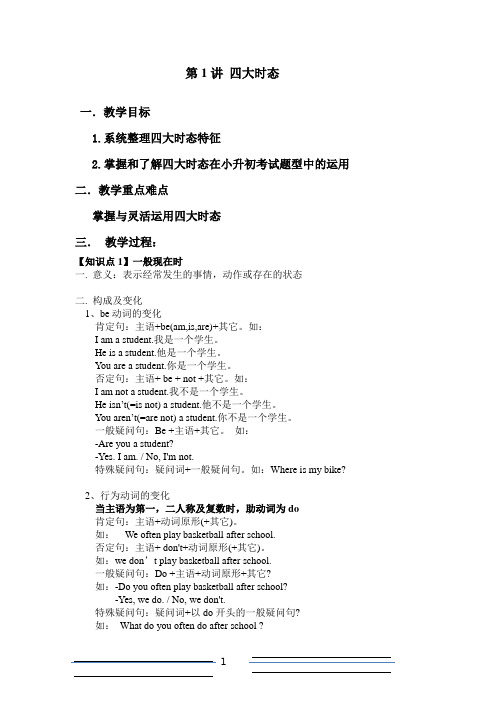
第1讲四大时态一.教学目标1.系统整理四大时态特征2.掌握和了解四大时态在小升初考试题型中的运用二.教学重点难点掌握与灵活运用四大时态三.教学过程:【知识点1】一般现在时一. 意义:表示经常发生的事情,动作或存在的状态二. 构成及变化1、be动词的变化肯定句:主语+be(am,is,are)+其它。
如:I am a student.我是一个学生。
He is a student.他是一个学生。
You are a student.你是一个学生。
否定句:主语+ be + not +其它。
如:I am not a student.我不是一个学生。
He isn’t(=is not) a student.他不是一个学生。
You aren’t(=are not) a student.你不是一个学生。
一般疑问句:Be +主语+其它。
如:-Are you a student?-Yes. I am. / No, I'm not.特殊疑问句:疑问词+一般疑问句。
如:Where is my bike?2、行为动词的变化当主语为第一,二人称及复数时,助动词为do肯定句:主语+动词原形(+其它)。
如:We often play basketball after school.否定句:主语+ don't+动词原形(+其它)。
如:we don’t play basketball after school.一般疑问句:Do +主语+动词原形+其它?如:-Do you often play basketball after school?-Yes, we do. / No, we don't.特殊疑问句:疑问词+以do开头的一般疑问句?如:What do you often do after school ?当主语为第三人称单数时,助动词为does肯定句:主语+动词三单式(+其它)。
如:He speaks English well.否定句:主语+ doesn’t+动词原形(+其它)。
小升初英语四大时态复习

第1讲四大时态一.教学目标1.系统整理四大时态特征2.掌握和了解四大时态在小升初考试题型中的运用二.教学重点难点掌握与灵活运用四大时态三.教学过程:【知识点1】一般现在时一. 意义:表示经常发生的事情,动作或存在的状态二. 构成及变化1、be动词的变化肯定句:主语+be(am,is,are+其它。
如:I am a student.我是一个学生。
He is a student.他是一个学生。
You are a student.你是一个学生。
否定句:主语+ be + not +其它。
如:I am not a student.我不是一个学生。
He isn’t(=is not a student.他不是一个学生。
You aren’t(=are not a student.你不是一个学生。
一般疑问句:Be +主语+其它。
如:-Are you a student?-Yes. I am. / No, I'm not.特殊疑问句:疑问词+一般疑问句。
如:Where is my bike?2、行为动词的变化当主语为第一,二人称及复数时,助动词为do肯定句:主语+动词原形(+其它。
如:We often play basketball after school.否定句:主语+ don't+动词原形(+其它。
如:we don’t play basketball after school.一般疑问句:Do +主语+动词原形+其它?如:-Do you often play basketball after school?-Yes, we do. / No, we don't.特殊疑问句:疑问词+以do开头的一般疑问句?如:What do you often do after school ?当主语为第三人称单数时,助动词为does肯定句:主语+动词三单式(+其它。
如:He speaks English well. 否定句:主语+ doesn’t+动词原形(+其它。
完整版)小学四大时态的综合练习

完整版)小学四大时态的综合练习基础知识概念结构、时间状语、否定和一般疑问句在英语语法中,有一些基础知识是必须掌握的,包括概念结构、时间状语、否定和一般疑问句等。
其中,概念结构是指一个句子中的各个成分之间的关系;时间状语则是表示时间的词语,如ago、yesterday、the day before yesterday、last week 等;否定形式包括主语+am/is/are+not以及主语+don't/doesn't+动词原形等;一般疑问句则是以am/is/are或do/does开头的问句,如Am/Is/Are+主语+。
或Do/Does+主语+。
表示过去某个时间在表示过去某个时间的时候,我们可以使用was/were来表示过去发生的动作或者状态,也可以使用had来表示过去的惯性动作或状态。
例如,我们可以说yesterday I was very busy,表示昨天我非常忙碌;又如,when I was young。
I had a lot of friends,表示在我年轻的时候,我有很多朋友。
表示经常、反复发生的动作或行为如果我们想要表达经常、反复发生的动作或行为,可以使用is/am/are+动词原形/动词的第三人称单数形式,或者使用often、usually、always、never、sometimes、every week、oncea week、on Sundays等时间状语。
例如,I usually go to bed at11 o'clock,表示我通常在11点钟睡觉;又如,she is always late for class,表示她上课总是迟到。
表示现况和性质在表示现况和性质的时候,我们可以使用have/has+动词原形+一段时间(如week/year/month/night)、in 1989、just now、at the age of twelve、one day、long long ago等时间状语。
(word完整版)小升初四大时态及习题

英语四大时态总复习一般现在时一、一般现在时的形式以及定义二、一般现在时的基本用法1. 表示事物的性质、特征以及经常性的行为,常与always, often, usually, every day等词连用。
Tom usually comes to school late. Tom 经常上学迟到。
2. 表示客观事实和普遍真理。
The sun rises in the east. 太阳从东方升起。
3. 用在格言、谚语中。
No pains, no gains.不劳而获。
一般过去时一、一般过去时的定义以及形式二、一般过去时的基本用法1. 表示在过去的时间里发生的动作或存在的状态,常与yesterday, last night, several years ago等连用。
I took a bus to school last Friday.上周五我坐公交车去上学。
2. 表示在过去的某段时间里,经常或反复发生的动作或状态。
They had a walk after supper last year. 他们去年经常晚饭后散步。
一般将来时一、一般将来时的定语以及形式二、一般将来时的基本用法1. 表示将来某个时间要发生的动作或状态,常与将来的时间状语tomorrow, next week等连用。
She will be back tomorrow.她明天就回来。
2. 表示将来某一时间内经常发生的动作或状态。
We’ll have a test every Monday this year. 今年的每一个周一我们都有考试。
巧学妙计Be going to 指当前已计划过或思考过的意图和打算;will/ shall 表示未事先思考或未计划的意图。
Be going to 还可以表明马上要发生,而will则表明说话者的观点、主观意识。
I’m going to visit mu aunt this week. 我打算这周去看望姑姑。
小升初复习时态总结

小升初复习时态总结时态是英语语法中非常重要的部分,正确使用时态能够准确地表达时间和动作的关系。
在小升初的英语复习中,时态的掌握是一个重要的方面。
本文将为大家总结一下小升初英语复习时态的内容。
一、一般现在时一般现在时表示经常性的、习惯性的或一般性的动作或状态。
构成一般现在时的肯定句式为:主语 + 动词原形(-s / -es变化)。
例如:I eat an apple every day.(我每天吃一个苹果。
)二、一般过去时一般过去时表示发生在过去的动作或状态。
构成一般过去时的肯定句式为:主语 + 动词过去式。
例如:He played football yesterday.(他昨天踢足球。
)三、一般将来时一般将来时表示将来某个时间要发生的动作或状态。
构成一般将来时的肯定句式为:主语 + will + 动词原形。
例如:I will go to the park tomorrow.(我明天将去公园。
)四、现在进行时现在进行时表示现在正在进行或发生的动作。
构成现在进行时的肯定句式为:主语 + am / is / are + 动词-ing形式。
例如:She is reading a book now.(她正在看书。
)五、过去进行时过去进行时表示过去某个时间正在进行的动作。
构成过去进行时的肯定句式为:主语 + was / were + 动词-ing形式。
例如:They were playing basketball at that time.(他们那时正在打篮球。
)六、现在完成时现在完成时表示过去发生并且与现在有关的动作或状态。
构成现在完成时的肯定句式为:主语 + have / has + 动词过去分词。
例如:She has watched this movie three times.(她已经看过这部电影三次了。
)七、过去完成时过去完成时表示在过去某一时间或动作之前已经完成的动作。
构成过去完成时的肯定句式为:主语 + had + 动词过去分词。
小学英语四大时态总结计划及练习试题
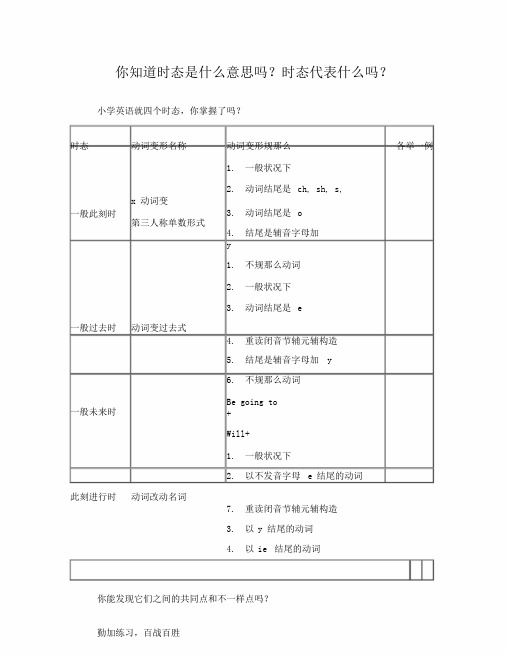
你知道时态是什么意思吗?时态代表什么吗?小学英语就四个时态,你掌握了吗?时态动词变形名称动词变形规那么各举一例1. 一般状况下2. 动词结尾是ch, sh, s,x 动词变一般此刻时第三人称单数形式3. 动词结尾是o4. 结尾是辅音字母加y1. 不规那么动词2. 一般状况下3. 动词结尾是 e一般过去时动词变过去式4. 重读闭音节辅元辅构造5. 结尾是辅音字母加y6. 不规那么动词一般未来时B e going to+Will+1. 一般状况下2. 以不发音字母 e 结尾的动词此刻进行时动词改动名词7. 重读闭音节辅元辅构造3. 以 y 结尾的动词4. 以 ie 结尾的动词你能发现它们之间的共同点和不一样点吗?勤加练习,百战百胜I .把以下动词变为第三人称单数形式。
1. clean--2. go--3. have--4. do-5.play--6. fly--7. come-- brush-13. swim-- 14. catch-- 15. write--16. eat-- 17. make-- 18. paint —19. learn-- 20. phone-- 21. run —22. hop-- 23. sing-- 24. pick —II .把以下动词变为过去式is\am________ fly______ plant_____ are________ drink_________play_______ go________ make ______ do_________ dance________worry_____ask _____ taste_________ eat________ draw________ put______ throw________ kick_________ pass_______ do ________III .把以下动词变为动名词形式。
wake________ make__________ come____________have____________take_________ leave__________ rid_________, regret__________,begin________ cut________, get_________, hit_________, run_________, set_________, sit__________, spit__________, stop_________, swim________, beg_________, drop__________, fit_________, nod_________, dig___________, forget_________, travel_________ visit_________ carry_________ enjoy___________ play ___________ study_____die_________ lie_________多加练习,百战百胜之时态篇一、用单词的正确形式填空:1. Mike _________ (do) his homework every day.2. There __________(be) some water in the glass.3. We like ________ (play) basketball after class.4. I like singing. I often _________(listen) to the music in theevening.5. My grandma_________(watch) TV every day.三、选择最正确的答案:1. ____Alice often play the piano? No, she _____. A. Do; do B. Does; does C. Does; doesn't2. ___ your penpal __ in Beijing? A. Do; live B. Do;lives C. Does; live3. Tom and Mike __ very excited, they will take a trip. A.is B. are C. am4. I like ________ very much. What about you? A.dance B. danced C. dancing5. The kite ____ a bird. A. look like B.is looking C. looks like6. Bill and I ___ good friends. A. is B. are C. am7. Sandy often ___ his homework on Sundays . A. do B.does C. did8. What do you usually do on the weekend? I __________.A. went swimmingB. go swimmingC. visitedgrandparents9. What do you usually do on your holiday? I usually __________.A. saw elephantsB. sing and danceC.took picture10. I ____ a student. I go to school ____bus every day. A. is;by B. am; on C. am; by11. I ____ a brother. She ____ a sister. A. have;has B. has; has C. have; have12. You ____ a student. He ____ a teacher. A. is; is B. are; is C. are; are13. He always _____ football games. A. watches B. watch C. doesn't14. My best friend _____ shells. A.collects B. collect C. often15. She doesn ’t _____ listening to the music. A. oft en B. like C. likes16. My mother and I ___ always watch romantic films. A.doesn’t B. don ’t C. do17. ---When _____ he get home on Friday?----He gets home at four on Friday. A. do B. does C. did18. Summer _________ spring.A. comes afterB. comes in C es before二、用单词的适合形式填空:1. look! Chen Jie and Mike are ___________ 〔sing 〕now.2. The small bear is _____________ (climb) the tree.3. Mike is ________________ (draw) picture.4. She is ________________ (do) the dishes.5. My brother __________ (make) kites now.6. My father is ___________ (read) a newspaper in living room.7. Ted is __________(answer) the phone.8. My uncle is ____________ (drive) a car.9. The students are ______________(listen) to their teachercarefully.10. Chen Jie is _________(wash) clothes.11. His sister _______ (be) writing an e-mail.12. We ______(be) cleaning the classroom now.13. I____ (be)working on my computer.14. They _____ (be)playing basketball.15. Look, The tiger ________ __________(walk).16. Look, The elephants ______ _____________(drink) water withtheir trunk.17. Look, The monkeys ________ ___________ (swing).18. Peter _________ ______________(take) pictures now.19. They _____ ________ 〔take 〕up the apples now.20. We _______ ________(catch) butterflies now.三、选择正确答案1. Every one ____ to their teacher in the classroom. A. are listening B. is listening C. listen2. They are singing and ___ together at the party now. A.dance B. danced C. dancing3. Listen! The birds ____. A. issinging B. are sing C. are singing4. Look! The kite ___ in the sky. A. fly B. flies C. is flying5. They ____ riding a forse. A. is B. are C. am。
- 1、下载文档前请自行甄别文档内容的完整性,平台不提供额外的编辑、内容补充、找答案等附加服务。
- 2、"仅部分预览"的文档,不可在线预览部分如存在完整性等问题,可反馈申请退款(可完整预览的文档不适用该条件!)。
- 3、如文档侵犯您的权益,请联系客服反馈,我们会尽快为您处理(人工客服工作时间:9:00-18:30)。
小升初四大时态综合检测一.选择题。
( )1. Look! Li Ping and Li Ying ________ basketball now.A. playB. playedC. are playingD. will play( )2. What did you do last night? I did my homework and _______TV.A. watchB. watchedC. am watching( )3. Can I______ this book?A. haveB. hasC. had( )4. I _______ English at 7:00 this morning.A.readsB. readC. reading( )5. He to school tomorrow.A. wentB. goC. will go( )6. Did your father his friend on the 5th of October?A. calledB. callC. is calling( )7. Where you last night?A. wasB. areC. were( )8. --Can you________ me with my Englsih? --Sure.A. helpsB. helpingC.help( )9.She like summer.A. doesn'tB. don'tC. didn’t( )10. There _______ a table in Jenny’s room.A. amB. isC. areD. were( )11.---May I ________ to Marry? ---This is Mary speaking.A.speakingB.speakC.speak toD.say to( )12.They like ______to music.A.listeningB.listensC.listenD.listened.( ) 13.John __ ____in an office.Her parnents _________in a hosptal.A. work,worksB.works ,workC.work,workingD.is working,work ( )14.Where _______ he ______ from?A.is,comeB.do,comeC.does,comeD.is,from( )15.--What is Tom doing in the classroom?--He _____something on the blackboard.A.drawsB.drawC.is drawingD.are drawing( ) 16. -- Are you going to be an engineer in the future?.-- _______A.Yes,I want to be a dancerB. Yes,I’m notC. Yes,I am ( ) 17. --Will his parents go to see the Terra Coatta Warriors tomorrow?--No,_________A.they willn’tB.they won’tC.they aren’tD.they don’t( ) 18.Mother_______me a nice present on my next birthday.A.will givesB.will giveC.givesD.give( ) 19. Laura ____ to school yesterday.A. doesn’t goB. didn’t goesC. doesn’t wentD. didn’t go ( ) 20. I ___ a beautiful girl on the street yesterday afternoon.A. seeB. seesC. sawD. seed二.用动词的适当形式填空。
1、Tom (swim) in the river the day after tomorrow.2、Why (be) they not here yesterday?3、Yesterday afternoon they (play) football with their English teacher.4、It’s eight o’clock now. The boys (watch) TV.5、She usually (do) her homework in the evening.6、Tom and Tony can’t (swim).7、--What does your father ______ (do)? --He’s a worker.8、Look! Jim and Tom (run) there.9. Su Hai and Su Yang ______________(have) eight lessons this term.10. -What day ______(be) it today? -It’s Saturday.11. ________ you _______ (visit) your grandparents last Spring Festival?12. --________ he _______ (fly) a kite on last Sunday? --Yes, he _______.13. Look . They ________________( have) an English lesson .14.They ______________(not ,water) the flowers now.15. Her father ____________ (not,read) a newspaper last night.16. He ________(eat) two eggs and some bread for breakfast this morning.17. Lucy ________(write) a story last night.18. I _________ (make)a mistake in the class yesterday evening.19.Tom likes_________(help) other people.20.Would you like to ________(have) some orange juice?三、填空。
1.他们现在在教室里唱歌吗?是的。
--_____they _______in the classroom? --Yes,they_____2.昨晚,我弟弟发高烧了。
My younger brother ______ _______ _______last night.3.你妈妈这个周末去购物吗?是,她要去买一些水果。
_____ your mother ______ ______ go shopping this _________? Yes, she ______. She ______ _______ _____buy some fruit. 4. 你们打算什么时候见面。
What time _______ you _________ _________meet?5.你通常怎么去上学?How _______you usually_____ ______ ______?6.我怎么样才能到人民医院?How ______I _____ _____the People’s Hospital?7.昨晚你玩得愉快吗?________ you ______a good time last night?8.听,有人在哭泣。
_______,someone ______ _______.9.这些天,我在读《哈利波特》。
I _______ _________Horry Potter these days.10.上周末你干什么去了?______ ______ you _____last weekend?四、句型转换。
1. Miss Zhu is living in Foshan now.(改否定)Miss Zhu ________ ________in Foshan now.2. I will go and join them.(改否定)I _______ go ______ join them.3.I’m going to get up at 6:30 tomorrow.(改一般疑问句)________ _______ ________ to get up at 6:30 tomorrow?4. She is going to listen to music after school.(对划线部分提问)_______ ______ she ______ _______ _______ after school?5. Amy likes playing computer games.(改为一般疑问句,作否定回答)___________________________________________________6. He speaks English very well.(改为否定句)______________________________________________7. John comes from Canada.(对划线部分提问)______ ______John ______from?8.The students are cleaning the classroom . ( 改一般疑问句并作肯定和否定回答) ____________________________________________________________________________________________________________9.I’m playing the football in the playground .(对划线部分进行提问)_______ ________ ________in the playground?10.She is always a good student.(改为一般疑问句,作否定回答) ______________________________________________________。
